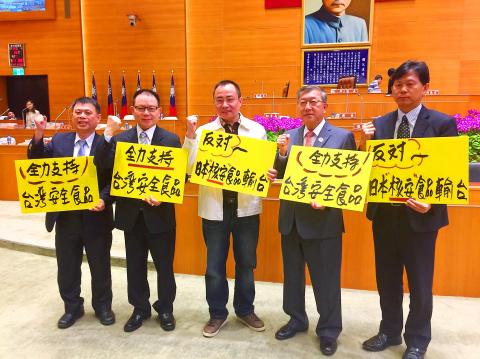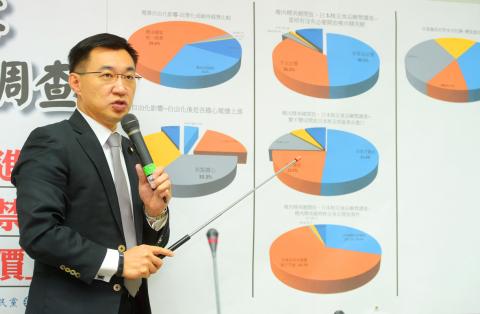Premier Lin Chuan (林全) yesterday reaffirmed the government’s plan to lift a ban on Japanese food products from five radiation-affected prefectures, saying that the deregulation would be carried out scientifically and gradually, while confirming that extra public hearings are planned after the 10 held over the weekend and on Monday ended in chaos due to protesters’ interference.
Taiwan and China are the only two nations that maintain a ban on food imports from the Japanese prefectures of Fukushima, Ibaraki, Tochigi, Gunma and Chiba, but Taiwan has to adopt a scientific approach to the food safety issue, as the ban creates an unfair trading environment, Lin said on Monday during a televised interview.
“Scientifically speaking, if the products pose no health risk, should we not reopen [imports of banned Japanese food] like other nations?” Lin said. “From a free trade perspective, it is absolutely unreasonable to prohibit products that are not radioactively contaminated.”

Photo: Tsai Meng-shang, Taipei Times
The nation has suspended food imports from the five prefectures since the Fukushima Dai-ichi nuclear power plant disaster in March 2011.
Lin said that the ban would be lifted partially and conditionally, as food products from Fukushima Prefecture are to remain banned and products from Ibaraki, Tochigi, Gunma and Chiba are to be allowed conditionally, while aquatic products and wild mushrooms from those prefectures would remain prohibited.
Produce from the Ibaraki, Tochigi, Gunma and Chiba have been collectively and mistakenly described as radioactively contaminated, Lin said, likening the prefectures to Changhua and Miaoli counties’ proximity to nuclear power plants in New Taipei City.

Photo: Chang Chia-ming, Taipei Times
The government will not lift the ban on products considered to be risky to consumers, even if they are allowed to circulate in Japan, such as foods that are prohibited for people younger than 18 due to high radioactivity.
“Our standards will only be stricter, not more relaxed, than those of Japan,” Lin said.
Lin’s remarks were aimed at easing public concern about the proposed lifting of the ban, as the controversy surrounding the issue has escalated, with protesters paralyzing 10 public hearings held by the Cabinet on the issue, while a Democratic Progressive Party (DPP) lawmaker has publicly opposed the proposal.
Lin said he regretted violence at the hearings, adding that the government has not yet finalized a deregulation plan and welcomes the public’s opinions.
“The new government has been dealing with unfair trade [regulations] on Japanese food imports at a gradual pace, but the government does not have to lift the ban now,” Lin said.
The Japanese government complained about Taiwan’s strict import rules well before the DPP took power in May, and Japanese trade representatives paid him a visit when he was running a DPP think tank, Lin said.
He rejected allegations that the proposed easing was made in exchange for closer economic ties and a meeting between People First Party James Soong (宋楚瑜) and Japanese Prime Minister Shinzo Abe at this weekend’s APEC summit, at which Soong is to represent President Tsai Ing-wen (蔡英文).
“The allegations are too far-fetched, too unrealistic. I have to say that there is no such a thing,” he said.
Lin confirmed that extra public hearings on lifting the ban would be held, but did not specify how many or when they would take place.
Meanwhile, the legislature yesterday failed to reach a consensus on the issue, as DPP lawmakers did not show up for a cross-caucus negotiation.
The Chinese Nationalist Party (KMT) caucus has demanded that a Taiwan-Japan mutual judicial assistance agreement be signed before the ban on food products from Japan’s radiation-affected regions be lifted.
The New Power Party caucus has called for the establishment of a Taiwan-Japan investigation and evaluation team, saying no imports should be allowed before the team presents a comprehensive report to the legislature.
Additional reporting by CNA

Tropical Storm Gaemi strengthened into a typhoon at 2pm yesterday, and could make landfall in Yilan County tomorrow, the Central Weather Administration (CWA) said yesterday. The agency was scheduled to issue a sea warning at 11:30pm yesterday, and could issue a land warning later today. Gaemi was moving north-northwest at 4kph, carrying maximum sustained winds near its center of up to 118.8kph and gusts of 154.8kph. The circumference is forecast to reach eastern Taiwan tomorrow morning, with the center making landfall in Yilan County later that night before departing from the north coast, CWA weather forecaster Kuan Shin-ping (官欣平) said yesterday. Uncertainty remains and

SEA WARNING LIKELY: The storm, named Gaemi, could become a moderate typhoon on Wednesday or Thursday, with the Taipei City Government preparing for flooding A tropical depression east of the Philippines developed into a tropical storm named Gaemi at 2pm yesterday, and was moving toward eastern Taiwan, the Central Weather Administration (CWA) said. Gaemi could begin to affect Taiwan proper on Tuesday, lasting until Friday, and could develop into a moderate typhoon on Wednesday or Thursday, it said. A sea warning for Gaemi could be issued as early as Tuesday morning, it added. Gaemi, the third tropical storm in the Pacific Ocean this typhoon season, is projected to begin moving northwest today, and be closest to Taiwan on Wednesday or Thursday, the agency said. Today, there would likely

DISRUPTIONS: The high-speed rail is to operate as normal, while several airlines either canceled flights or announced early departures or late arrivals Schools and offices in 15 cities and counties are to be closed today due to Typhoon Gaemi, local governments announced last night. The 15 are: Taipei, New Taipei City, Taoyuan, Tainan, Keelung, Hsinchu and Kaohsiung, as well as Yilan, Hualien, Hsinchu, Miaoli, Chiayi, Pingtung, Penghu and Lienchiang counties. People should brace for torrential rainfall brought by the storm, with its center forecast to make landfall on the east coast between tonight and tomorrow morning, the Central Weather Administration (CWA) said. The agency issued a sea warning for the typhoon at 11:30pm on Monday, followed by a land warning at 11:30am yesterday. As of

CASUALTY: A 70-year-old woman was killed by a falling tree in Kaohsiung as the premier warned all government agencies to remain on high alert for the next 24 hours Schools and offices nationwide are to be closed for a second day today as Typhoon Gaemi crosses over the nation, bringing torrential rain and whipping winds. Gaemi was forecast to make landfall late last night. From Tuesday night, its outer band brought substantial rainfall and strong winds to the nation. As of 6:15pm last night, the typhoon’s center was 20km southeast of Hualien County, Central Weather Administration (CWA) data showed. It was moving at 19kph and had a radius of 250km. As of 3pm yesterday, one woman had died, while 58 people were injured, the Central Emergency Operation Center said. The 70-year-old